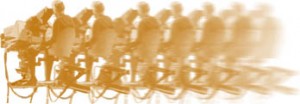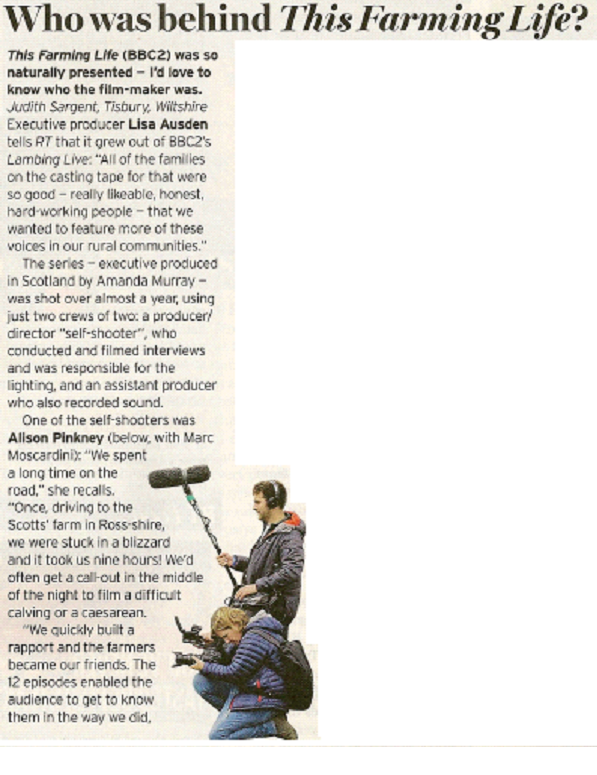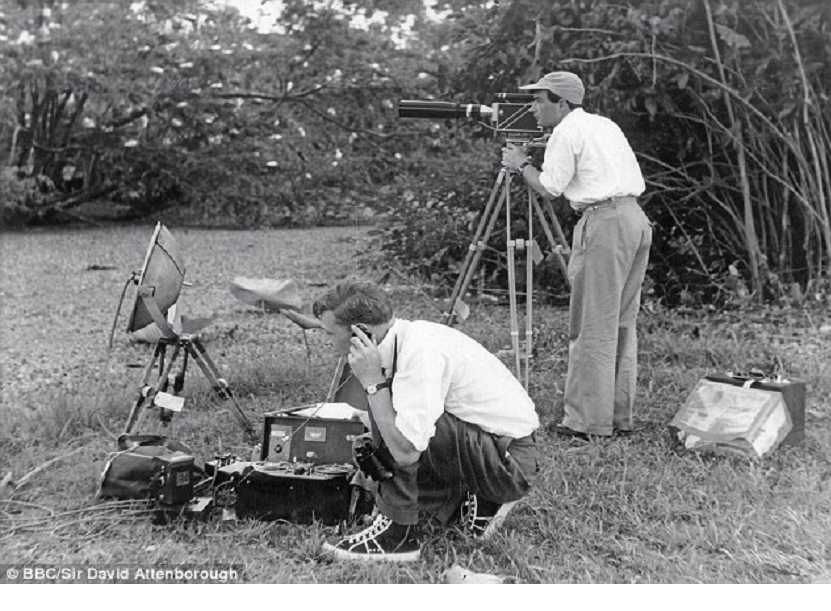Pat Heigham
I’ve enjoyed Portillo’s Train Journey programmes, but the ‘Filmed and Directed by’ is extremely variable. Some episodes are nicely done, but there’s also a lot of handheld stuff which is bl**dy awful. Now, is it a Director who thinks he’s a cameraman, or vice-versa?
Bernie Newnham
The answer is – that’s the way it is these days.
At the university where I work, we teach production techniques, camera, sound, editing etc etc. Nobody is good at everything, and many are rubbish at everything, but just here and there are people who can do all the bits well enough to make broadcast tv. This isn’t specialist level stuff, no feature films or major dramas, just straightforward docs like the Portillo series with a talking head and pretty views with the odd demo dropped in. It’s perfectly possible to combine the various skills and get a good show made, as long as it isn’t complex. When I was doing this for a living I’d get the specialists in as required. A sparks was usually the first – you don’t want to be filming in Harrods or Harvey Nicks or wherever without someone looking after the lights.
Pat Heigham
I saw the item shown in part below in the “Radio Times” for 23-29 April 2016.
Producer/Director and Associate Producer ‘doing’ the camera and sound!
I wonder how much training they had and experience they offered.
Not to mention denying work to properly trained personnel.
(Click on the picture below to see larger version:
use your Browser’s BACK button to return to this page)
Keith Wicks
Well, at least they used a boom. Perhaps some of the adverse comments about radio mics are beginning to filter through.
Alasdair Lawrance
It would also be good to know how long was spent in ‘post’, and what kind of shooting ratio. How many days ‘stand-by’ were paid for? Travel expenses? Kit hired and not used?
Nick Ware
I haven’t seen the programme, but I’d say for that particular job they’ve probably got it right. There are plenty of self-shooters around who are perfectly competent, whether they are what we would consider ‘properly trained’ or not. There’s one who occasionally calls me when she has something a little more complex than she feels able to handle. Otherwise she’s usually on her own, conducting the interviews herself from behind the camera, nice subtle lighting, etc. She knows what she’s doing, and will probably edit it too. That kind of low-key approach can get her into places where the bally-hoo of a ‘proper’ crew whingeing about lunch breaks, overtime, health and safety risk assessments, etc., would be way too inhibiting.
Like it or not, it’s the way much of it is done now, and it can work well (and cheap!). Often very badly, though, I’d be the first to agree.
I can’t say I’m sorry that the days of three blokes huddled round a Nagra, plus another on the pole, and Joe Telford blacking the studio if the numbers don’t add up, are long gone!
And besides, do you want to be stuck in the Scottish Highlands in a blizzard for a year? No, nor me!
By the way, no-one is necessarily being denied work (assuming you believe you’re owed any) and there’s nothing to stop ‘properly trained’ personnel from setting themselves up as self-shooting producer/directors with the imagination to create work. Oops! Controversial, but the world has changed around us.
Bernie Newnham
There are times and places where not having a crew, just a good well trained self shooting producer (like me) and his side-kick, is a major advantage.
One of – and possibly the first – time it was done to advantage at the BBC was on “Morning Surgery”, the pioneer programme that was partially made this way. Some of us had been talking to one of the doctors at Alnwick Hospital where we were working, and he asked if we’d like to film his night shift over the weekend. Jack Weber and I then talked to Caroline van den Brul – our exec producer. "It’ll just be us, after all. We’ll stay here over the weekend instead of going home, and we’ll work through Saturday night till we get enough material. We’ll have all three cameras and we’ll get good stuff. " A voluntary overnight, no formal meal breaks, no time sheets, just people doing a good job on something they were very much part of and were enjoying enormously. It made a great film, with an ambulance carrying a heart attack victim, someone who been bitten by a sheep, and other stuff, ending on a shot looking in from the night as Dr Bill filled in his paper work.
Another instance on that show was the rescue helicopter. It’s done endlessly these days but was rare then because you needed a crew with normally one camera otherwise it gets very expensive.. We had three cameras operated by the team at no extra cost to the production – basically no cost at all, as nothing and no-one was being paid for by the hour. You just need to get people trained properly, and they aren’t necessarily untrained because they didn’t come by the traditional routes.
When we were joined by a professional crew (Chris Eames and co), they joined in with gusto and were very much part of the production team to the extent that Chris at one point used one of the DV cameras where a bigger one wasn’t suitable.
There are a lot of other places where you want, and have the money to pay for, top crewing. A major one of those is modern drama, though I must admit that I’ve always fancied doing a drama in the way we shot “Morning Surgery” and all the other things that followed. People have done it and it tends to be rubbish, because if you get a good script you might as well do it the expensive way. and sell around the world.
Tony Crake
I watched one of those Scottish farm things some weeks back and I thought "no thanks" . Staying up endless nights waiting for a difficult lambing…Er? No! I rescued enough sheep when I was on transmitters !!
And there were plenty of things on OB’s going that sort of way… quite glad I retired when I did !
Isn’t the trouble that as soon as the accountants see the success and financial merits of “ … no formal meal breaks, no time sheets…” , they want everybody and every programme to do the same?
Bernie Newnham
Caroline had started trying to make a morning version of “Hospital Watch” with a budget of £1.25M, and she was told that morning budgets weren’t as big as that and she could have £250,000.
Does she sit in the office and stare into space or see if she can make the programme for the price?
It happened that it was exactly the moment when small light DV kit was coming on the market – cameras for £5k that produced pictures and sound nearly as good as cameras that cost £50k. Could production people learn to operate the gear in a short time to a standard expected of junior camera operators, whilst also bringing along years of producer experience? As it turned out, yes. So she could do the programme for the price by using new ways with technology, the way it is always.
We did four weeks making DV films, then used an OB crew for the "live" bit of the show. We didn’t have a truck, we had a hospital trolley with a Grass Valley 100 on one end, a sound mixer on the other, and a BetaSP machine in the middle. We’d put our two tripod cameras with cameramen in the operating theatre, or wherever, and plug the whole thing into the nearest 13amp socket. We had one of the first online Avids in a disused operating theatre with Peter Parnham putting the shows together as we shot them. Then TX from Newcastle on SP. A tiny triumph.
Yes, accountants will accountant no matter what, and they’ll always try to force costs down because that’s what they do. If the result of cost cutting is rubbish – by whatever standard you set – then you do something about it. Every “Morning Surgery” film stood up by any standard – not all material does viz “Jamaica Inn”, a somewhat more expensive epic made by highly trained staff.
Hugh Sheppard
Jamaica Inn? Self- Shooting? How could the BBC ever claim to set industry standards any more?
Terry Meadowcroft
My take on the BBC now is that it was a wonderful place to be once, and one which taught me many of my skills, and in which I happily used those skills to help make wonderful programmes. End of story. It is now slowly going down the tubes, which for me is painfully sad.
Shame on all those who have anything to do with letting, nay, making, this happen.
Alec Bray
In the far off days of “Zoo Quest” (1954 onwards), David Attenborough was director, sound recordist, editor, narrator and presenter. It was just him and his cameraman, Charles Lagus.
(Click on the picture below to see larger version:
use your Browser’s BACK button to return to this page)





